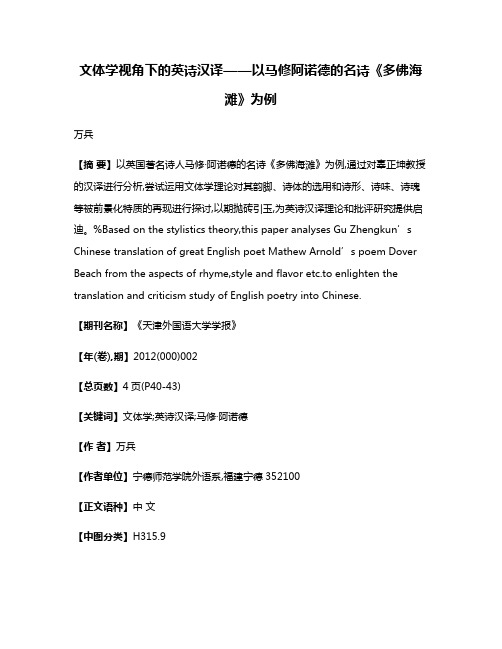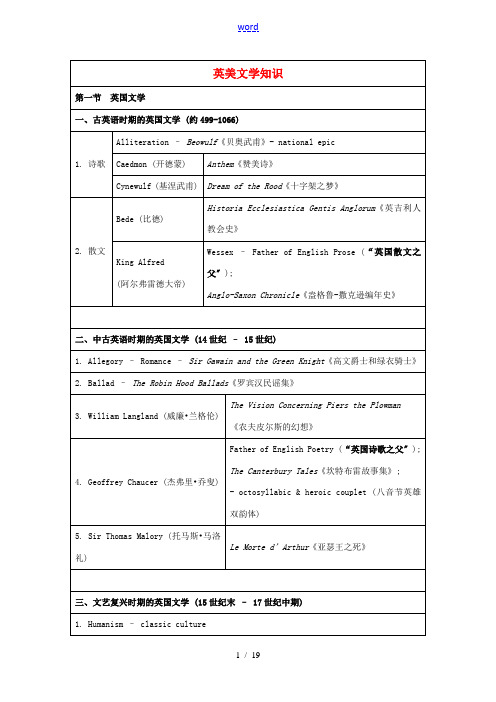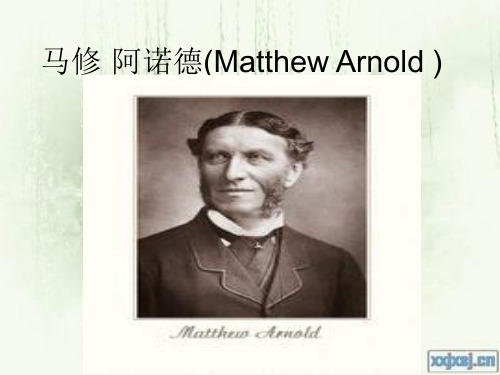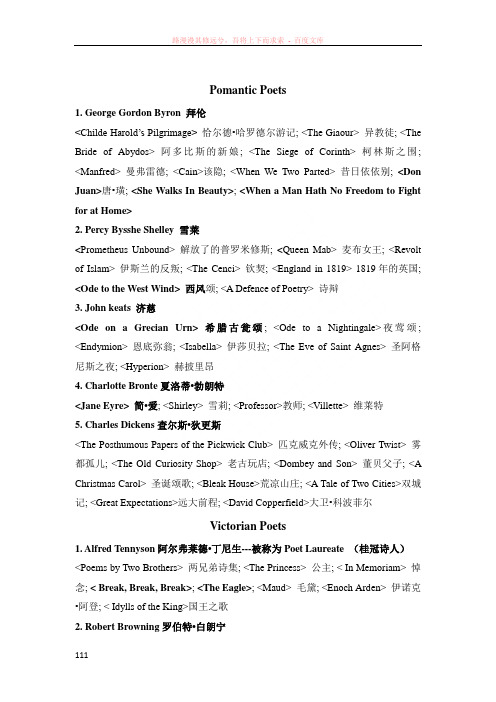英国文学课件 Dover Beach
《英国浪漫主义文学》课件

历史背景
哲学思考
英国浪漫主义文学作品中常常包含深 刻的哲学思考,探讨人性、道德、自 由等主题,表现出对人类命运的关注 和思考。
英国浪漫主义文学关注历史背景,将 文学作品与历史事件、社会现实等联 系起来,展现出浓厚的历史感。
05
英国浪漫主义文学的影响与评价
对世界文学的影响
01
丰富了世界文学的多样性
作品风格
现实主义与浪漫主义相结合, 注重细节描写和人物塑造
晚期浪漫主义
时间范围
1830年-1860年
特点
关注人性探索,深入挖掘内心世界,强调个 性表达
代表人物
丁尼生、布朗宁、梅尔维尔等
作品风格
心理分析、象征主义和神秘主义,注重艺术 表现和情感渲染
03
英国浪漫主义文学的主要代表人 物及其作品
威廉·布莱克
诗歌形式与技巧
诗歌形式
英国浪漫主义诗歌形式多样,包 括长诗、短诗、叙事诗等,强调 韵律和节奏感。
象征与隐喻
英国浪漫主义诗歌善于运用象征 和隐喻手法,通过具象的描绘传 达抽象的概念和情感。
情感渲染
英国浪漫主义诗歌注重情感渲染 ,通过强烈的情感表达和渲染来 打动读者。
自然与人文的融合
பைடு நூலகம்
自然描绘
英国浪漫主义作家善于描绘自然,将 自然元素融入到作品中,强调人与自 然的和谐共存。
01
时间范围
1789年-1800年
02
03
04
代表人物
拜伦、雪莱、济慈、华兹华斯 等
特点
强调个人情感、自然和自由, 反对理性主义和传统束缚
作品风格
富有想象力,追求形式和语言 的创新
中期浪漫主义
时间范围
文体学视角下的英诗汉译——以马修·阿诺德的名诗《多佛海滩》为例

文体学视角下的英诗汉译——以马修阿诺德的名诗《多佛海滩》为例万兵【摘要】以英国著名诗人马修·阿诺德的名诗《多佛海滩》为例,通过对辜正坤教授的汉译进行分析,尝试运用文体学理论对其韵脚、诗体的选用和诗形、诗味、诗魂等被前景化特质的再现进行探讨,以期抛砖引玉,为英诗汉译理论和批评研究提供启迪。
%Based on the stylistics theory,this paper analyses Gu Zhengkun’s Chinese translation of great English poet Mathew Arnold’s poem Dover Beach from the aspects of rhyme,style and flavor etc.to enlighten the translation and criticism study of English poetry into Chinese.【期刊名称】《天津外国语大学学报》【年(卷),期】2012(000)002【总页数】4页(P40-43)【关键词】文体学;英诗汉译;马修·阿诺德【作者】万兵【作者单位】宁德师范学院外语系,福建宁德352100【正文语种】中文【中图分类】H315.9一、引言文体学是一门介于语言学、文艺学、美学、心理学等之间的综合性边缘学科。
这一理论的运用对英诗汉译及批评研究等问题有极强的解释力,而此方面的研究文章尚不多见。
本文以英国著名诗人马修· 阿诺德的名诗《多佛海滩》为例,通过分析辜正坤教授的汉译,对其韵脚、诗体的选用和诗形、诗味、诗魂等被前景化特质的再现进行探讨,旨在为英诗汉译理论和批评研究提供启迪。
二、原诗前景化特质的再现诗人从英吉利海峡遥望法兰西灯火明灭,英伦峭壁森森,月洗平沙,潮卷砾石,更有怒掷高滩之海浪。
两节诗写景动人,映衬诗人满腹悲愁,意境悲壮。
译者极力琢磨,充分兼顾中国读者的接受心理和阅读情趣,良苦用心足见一斑。
高中英语 中英对照英美文学知识素材-人教版高中全册英语素材

Alexander’s Feast《亚历山大的宴会》;
Absalom and Achitophel《押沙龙与阿齐托菲尔》;
The Indian Queen;The Indian Emperor;The Conquest of Granada《格兰纳达的征服》;Tyrannick Love;All for Love;
12. Jonathan Swift
(乔纳森•斯威夫特)
A Modest Proposal《一个小小的建议》;Travels into Several Remote Nations of the World by Lemuel Gulliver《格里佛游记》;A Tale of a Tub《桶的故事》
传奇剧
Pericles《泰尔亲王配力克里斯》;Cymbeline《辛白林》;The Winter’s Tale;Tempest《暴风雨》
8. Ben Jonson (本•琼森)
edy of manners (风俗喜剧的奠基人);
Every Man In His Humor《人性互异》
9. John Donne (约翰•多恩)
Metaphysical Poems (“玄学派〞诗歌创始人);
Songs and Sonnets《歌曲与十四行诗》
10. George Herbert (乔治•赫伯特)
the saint of the Metaphysical school (“玄学派诗圣〞);
The Temple《神殿》
11. Andrew Marwell (安德鲁•马韦尔)
5. Sir Thomas Malory (托马斯•马洛礼)
Le Morte d’Arthur《亚瑟王之死》
马修·阿诺德资料

The appreciation of Poetry
• The author use metaphor and symbolism to reveal the disruption of the British society at that time, Pointed out that people went back to the era of lacking sincere faith 作者利用对海巧妙的比喻以及感情上的投射描写 出当时英国社会的混乱和人们渐渐缺失的真诚信 仰,又结合象征手法深刻揭示特定时代英国社会 人们的精神频临崩溃现象,将现在和过去进行对 比,指出人们又回到那个没有信仰的时代,彼此 没有真爱,只有恐惧,争斗,内心极其矛盾的一 面。
3)在这些诗行里,阿诺德用了“melancholy”、 “long”、“vast edges”和“drear”等词,奏响 了“信仰之海”潮退的哀歌,传送着一曲失落和 绝望的幽怨。 4)诗歌的最后以“darkling plain”和“ignorant armies”结尾,表现出一种极度沮丧绝望的心境。
Wonderful words :
2)此时的大海已不再是风平浪静,“grating roar”、“fling”、 “tremulous”等词的描 述已完全改变了那种田园诗式的意境,形成 了一种紧张与力度很强的效果。诗歌的意 象也由前面的视觉画面切换到了听觉的描 述,细致地刻画出此时海景的黑暗面,而最后 一行的“sadness”,使得这种黯然的韵味更 加厚重了。
——Daisy
• 也曾有过满潮,像一根灿烂的腰带, 把全球的海岸围绕。 但如今我只听得 它那忧伤的退潮的咆哮久久不息, 它退向夜风的呼吸, 退过世界广阔阴沉的边界, 只留下一滩光秃秃的卵石。 • 啊,爱人,愿我们 彼此真诚!因为世界虽然 展开在我们面前如梦幻的国度, 那么多彩、美丽而新鲜, 实际上却没有欢乐,没有爱和光明, 没有肯定,没有和平,没有对痛苦的救助; 我们犹如处在黑暗的旷野, 斗争和逃跑构成一片混乱与惊怖, 无知的军队在黑夜中互相冲突。
英国文学选读作家作品

Pomantic Poets1. George Gordon Byron 拜伦<Childe Harold’s Pilgrimage> 恰尔德•哈罗德尔游记; <The Giaour> 异教徒; <The Bride of Abydos> 阿多比斯的新娘; <The Siege of Corinth> 柯林斯之围; <Manfred> 曼弗雷德; <Cain>该隐; <When We Two Parted> 昔日依依别; <Don Juan>唐•璜; <She Walks In Beauty>; <When a Man Hath No Freedom to Fight for at Home>2. Percy Bysshe Shelley 雪莱<Prometheus Unbound> 解放了的普罗米修斯; <Queen Mab> 麦布女王; <Revolt of Islam> 伊斯兰的反叛; <The Cenci> 钦契; <England in 1819> 1819年的英国; <Ode to the West Wind> 西风颂; <A Defence of Poetry> 诗辩3. John keats 济慈<Ode on a Grecian Urn> 希腊古瓮颂; <Ode to a Nightingale>夜莺颂; <Endymion> 恩底弥翁; <Isabella> 伊莎贝拉; <The Eve of Saint Agnes> 圣阿格尼斯之夜; <Hyperion> 赫披里昂4. Charlotte Bronte夏洛蒂•勃朗特<Jane Eyre> 简•爱; <Shirley> 雪莉; <Professor>教师; <Villette> 维莱特5. Charles Dickens查尔斯•狄更斯<The Posthumous Papers of the Pickwick Club> 匹克威克外传; <Oliver Twist> 雾都孤儿; <The Old Curiosity Shop> 老古玩店; <Dombey and Son> 董贝父子; <A Christmas Carol> 圣诞颂歌; <Bleak House>荒凉山庄; <A Tale of Two Cities>双城记; <Great Expectations>远大前程; <David Copperfield>大卫•科波菲尔Victorian Poets1. Alfred Tennyson阿尔弗莱德•丁尼生---被称为Poet Laureate (桂冠诗人)<Poems by Two Brothers> 两兄弟诗集; <The Princess> 公主; < In Memoriam> 悼念; < Break, Break, Break>; <The Eagle>; <Maud> 毛黛; <Enoch Arden> 伊诺克•阿登; < Idylls of the King>国王之歌2. Robert Browning罗伯特•白朗宁< My Last Dutchess> 我已故的公爵夫人; <Paracelsus> 巴拉塞尔士; <Strafford> 斯特拉福; <Pippa Passes> 皮帕走过了; <Dramatic Lyrics> 戏剧抒情诗; < Dramatic Romance and Lyrics> 戏剧传奇及抒情诗; <Men and Women> 男男女女; <Dramatic Personae> 剧中人物; <The Ring and the Book> 指环与书3. Matthew Arnold 马修•阿诺德<The Strayed Reveller> 迷途浪子; <Poems> 诗集; <Poems: Second Series> 诗歌二集; <New Poems> 新诗集; <Essays in Criticism> 评诗集; <Culture and Anarchy> 文化与无政府; <Literature and Dogma> 文学与教条; <Dover Beach> 多福海滩4. Thomas Hardy托马斯•哈代---(小说多以农村生活为背景;自然主义小说家。
英国文学课件-Dover-Beach

Vocabulary Matching
1. tide 2. glimmering 3. grating 4. cadence 5. ebb
a. the rhythmic repetition of sound b. when the tide recedes c. the rise and fall of the sea d. making a scraping sound e. shining faintly or unsteadily
“Dover Beach” by Matthew Arnold Prereading
1
Matthew Arnold
Matthew Arnold, wrote G. W. E. Russell in Portraits of the Seventies, is "a man of the world entirely free from worldliness and a man of letters without the faintest trace of pedantry" (Russell, 1916). A familiar figure at the Athenaeum Club, a frequent diner-out and guest at great country houses, fond of fishing and shooting, a lively conversationalist, affecting a combination of foppishness and Olympian grandeur, he read constantly, widely, and deeply, and in the intervals of supporting himself and his family by the quiet drudgery of school inspecting, filled notebook after notebook with meditations of an almost monastic tone. In his writings, he often baffled and sometimes annoyed his contemporaries by the apparent contradiction between his urbane, even frivolous manner in controversy, and the "high seriousness" of his critical views and the melancholy, almost plaintive note of much of his poetry. "A voice poking fun in the wilderness" was T. H. Warren's description of him.
【最新】英国文学ppt课件

2021/2/2
An Introduction to British and American Culture
Charles Dickens (1812-1870)
佳句赏析 “It was the best of times, it was the worst of times, it was the age of wisdom, it was the age of foolishness, it was the epoch of belief, it was the epoch of incredulity…” 这是最好的时代,这是最坏的时代;这是智慧 的时代,这是愚蠢的时代;这是信仰的时期, 这是怀疑的时期……”
2021/2/2
An Introduction to British and American Culture
English Novel
Daniel Defoe (1660-1731)
Robinson Crusoe describes how Crusoe makes great efforts to overcome the hardships and difficulties he encounters on the island. . .
Three famous plays : 1.Tamburlaine (1587) 《帖木耳大帝》 2.The Jew Of Malta (1592) 《马耳它的犹太人》 3.The Tragical History of Dr. Faustus (1588)
《浮士德博士的悲剧》
2021/2/2
An Introduction to British and American Culture
英国文学维多利亚时期

练习
• In the 19th century English literature, a new literary trend ____ appeared. And it flourished in the forties and in the early fifties.
– Works • Tess of the D’urbervilles 《德伯家的苔丝》 • The Return of the Native 《还乡》 • Jude the Obscure 《无名的裘德》 • Far from the Madding Crowd 《远离尘嚣》 • The Mayor of Casterbridge 《卡斯特桥市长》 • Dynasties 《列王》
Victorian poets and poetry
Alfred Tennyson (1809——1892) 阿尔佛 雷德丁尼生 - A representative poet of the Victorian Age. “桂冠诗人”(Poet Laureate)
• Works: • In Memoriam 《悼念》 • The idylls of the King 《国王叙事诗》 • Ulysses 《尤利西斯》
• A. romanticism B. naturalism
• C. realism
D. critical realism
D
练习
• Which of the following writings is not the work by Charles Dickens?
A. A Tale of Two Cities.
- 1、下载文档前请自行甄别文档内容的完整性,平台不提供额外的编辑、内容补充、找答案等附加服务。
- 2、"仅部分预览"的文档,不可在线预览部分如存在完整性等问题,可反馈申请退款(可完整预览的文档不适用该条件!)。
- 3、如文档侵犯您的权益,请联系客服反馈,我们会尽快为您处理(人工客服工作时间:9:00-18:30)。
The sea is calm to-night. The tide is full, the moon lies fair Upon the straits; —on the French coast the light Gleams and is gone; the cliffs of England stand, Glimmering and vast, out in the tranquil bay. Come to the window, sweet is the night-air! Only, from the long line of spray Where the sea meets the moon-blanched land, Listen! you hear the grating roar Of pebbles which the waves draw back, and fling, At their return, up the high strand, Begin, and cease, and then again begin, With tremulous cadence slow, and bring The eternal note of sadness in. Sophocles long ago Heard it on the Aegean, and it brought Into his mind the turbid ebb and flow Of human misery; we Find also in the sound a thought, Hearing it by this distant northern sea.
Matthew Arnold, wrote G. W. E. Russell in Portraits of the Seventies, is "a man of the world entirely free from worldliness and a man of letters without the faintest trace of pedantry" (Russell, 1916). A familiar figure at the Athenaeum Club, a frequent diner-out and guest at great country houses, fond of fishing and shooting, a lively conversationalist, affecting a combination of foppishness and Olympian grandeur, he read constantly, widely, and deeply, and in the intervals of supporting himself and his family by the quiet drudgery of school inspecting, filled notebook after notebook with meditations of an almost monastic tone. In his writings, he often baffled and sometimes annoyed his contemporaries by the apparent contradiction between his urbane, even frivolous manner in controversy, and the "high seriousness" of his critical views and the melancholy, almost plaintive note of much of his poetry. "A voice poking fun in the wilderness" was T. H. Warren's description of him.
The Sea of Faith Was once, too, at the full, and round earth's shore Lay like the folds of a bright girdle furled. But now I only hear Its melancholy, long, withdrawing roar, Retreating, to the breath Of the night wind, down the vast edges drear And naked shingles of the world. Ah, love, let us be true To one another! for the world, which seems To lie before us like a land of dreams, So various, so beautiful, so new, Hath really neither nor love, nor light, Nor certitude, nor peace, nor help for pain; And we are here as on a darkling plain Swept with confused alarms of struggle and flight, Where ignorant armies clash by night.
1. tide: c a. the rhythmic repetition of sound 2. glimmering: e b. when the tide recedes 3. grating: d c. the rise and fall of the sea 4. cadence: a d. making a scraping sound 5. ebb: b e. shining faintly or unsteadily
Arnold is sometimes called the third great Victorian poet, along with Alfred, Lord Tennyson and Robert Browning.Arnold was keenly aware of his place in poetry. In an 1869 letter to his mother, he wrote: “My poems represent, on the whole, the main movement of mind of the last quarter of a century, and thus they will probably have their day as people become conscious to themselves of what that movement of mind is, and interested in the literary productions which reflect it. It might be fairly urged that I have less poetical sentiment than Tennyson and less intellectual vigour and abundance than Browning; yet because I have perhaps more of a fusion of the two than either of them, and have more regularly applied that fusion to the main line of modern development, I am likely enough to have my turn as they have had theirs."
1. tide 2. glimmering 3. grating 4. cadence 5. ebb
a. the rhythmic repetition of sound b. when the tide recedes c. the rise and fall of the sea d. making a scraping sound e. shining faintly or unsteadily
